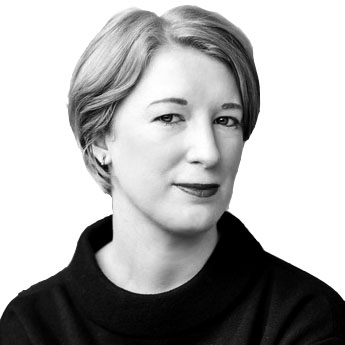Whenever the novelist Ann Hood tells a stranger that she was a flight attendant in the late 70s, they want stories. Lucky for them, over a turbulent career spanning almost a decade, Hood amassed plenty of them, including the time she witnessed a woman in first class breastfeeding her cat.
Those were still the golden days of air travel, when much of a flight attendant’s duties, especially at the front of the airplane, was performance: carving the Chateaubriand to serve with a freshly dressed salad, placing linen napkins and glasses of champagne just so. Even in coach, prices and standards were high enough to make flying anywhere a rare, memorable event.
Hood became a flight attendant in 1978, fresh out of college, just before deregulation transformed the industry, democratizing flight but jettisoning much of what had made it special. She landed a dream job at Howard Hughes’s unfailingly glamorous, if financially unstable, TWA, proud to march across Eero Saarinen’s swooping white terminal at J.F.K. in her navy-blue-and-maroon Ralph Lauren uniform.
Onboard double-decker 747s, she mingled with celebrities who also belong to a lost era—that nice Bill Cosby, that charming O. J. Simpson. Despite the risks of flying in this era—hijackings were a frequent occurrence—Hood mostly dwells on the thrills in her new memoir, Fly Girl.

But the dangers are never far away. Her training ends abruptly when a horrific American Airlines DC-10 crash at Chicago O’Hare kills all 273 passengers and crew. TWA flew a different model of jet, and with DC-10s grounded across the country, its flights were suddenly in high demand—as were its freshly minted flight attendants.
On the Job
Hood’s early ambitions to be a writer—she has published about 30 books since hanging up her uniform—clearly helped her to manage the job’s exhausting schedule and no less exhausting sexism, with an Ephronian approach of turning it all into copy. After all, there can’t be many better proving grounds for a student of human behavior than an airline. So it’s a shame that in her effort to keep things breezy, Hood sometimes pulls her punches, relying on surface detail to carry the story, and quickly shifting away from darker topics, as though she’s reluctant to go beyond the barstool anecdote.
When Hood started flying, the women known at the time as “stewardesses” were enshrined in the public consciousness as somewhere between waitress and prostitute, thanks to best-sellers such as 1967’s Coffee, Tea, or Me?—a purported memoir that was actually the work of American Airlines P.R. man Donald Bain. A constant part of a flight attendant’s job was fending off the jokes, comments, and passes with a never-slipping smile.
Then there were the routine humiliations of the industry itself. Weight restrictions weren’t lifted until 1991, and during their probation, flight attendants had been subject to unannounced weigh-ins. One friend is dismissed for gaining five pounds.
TWA’s financial woes meant that Hood also worked for several other short-lived domestic airlines, sometimes even in a (shudder) polyester uniform. When, in 1985, American businessman Carl Icahn comes on the scene as the airline’s disastrous cost-slashing owner, Hood finally loses patience with the sexist disrespect shown to flight attendants.
After Icahn tries to fire experienced workers in favor of new hires—in his words, to “de-cunt and re-cunt” the airline, as Hood noted in Salon in 2010—the staff, including Hood, walk out, forming an incongruous picket line at the TWA terminal. The protest ends in failure, but when Hood is asked to return, she realizes that, having published her first novel, it’s time to move on.
Hood’s love for air travel, paused only by the pandemic, is infectious and undying, although she admits to cringing at the modern practice of bringing garbage bags through the aisles—in her day, she was taught that “TWA flight attendants do not touch trash.” Everything from crumpled napkins to brimming coffee cups had to be passed on a tray.
Those standards were as absurd as they were absolute. And although the reasons for their disappearance are only logical, it’s impossible not to lament the magic that disappeared with them.

Joanna Scutts is the author of The Extra Woman: How Marjorie Hillis Led a Generation of Women to Live Alone and Like It. Her new book, Hotbed: Bohemian New York and the Secret Club That Sparked Modern Feminism, will be published on June 7


